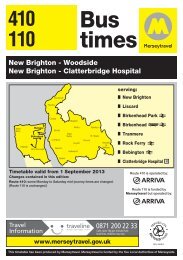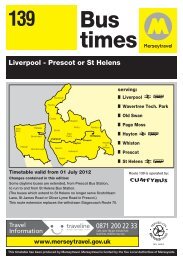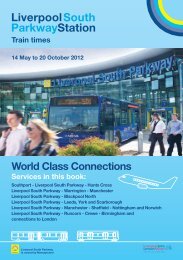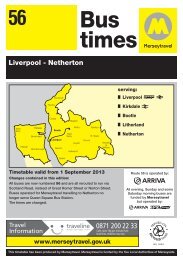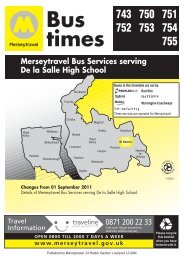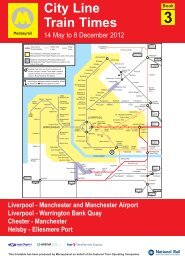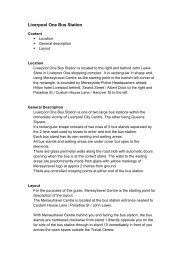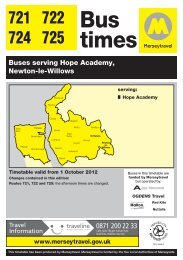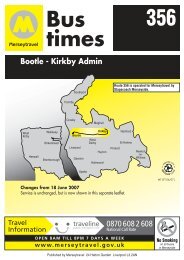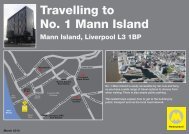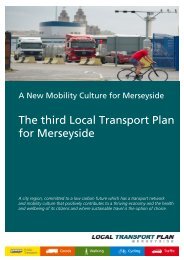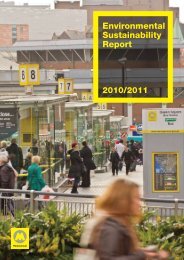School Transport Policy - Merseytravel
School Transport Policy - Merseytravel
School Transport Policy - Merseytravel
You also want an ePaper? Increase the reach of your titles
YUMPU automatically turns print PDFs into web optimized ePapers that Google loves.
Journey to <strong>School</strong> <strong>Policy</strong>This policy will come into force on 1 April 2013 and will continue untilsuperseded. It will be reviewed on an annual basis and updated asnecessary.Aims of <strong>Policy</strong>The aims of this journey to school policy are to support <strong>Merseytravel</strong>’s wideraims, in relation to the way that it supports access to primary and secondaryeducation.The overall objective of this policy is:“To consider sustainable access to primary and secondary education,promoting the health and wider environmental benefits of walking andcycling, alongside securing value for money for the Authority’sinvestment in supported bus services.”Whilst acknowledging that there are numerous ways in which children cantravel to school, this policy advocates a hierarchical approach. Whilst thepolicy prioritises walking or cycling for health and wellbeing purposes, there isclearly an accepted requirement for children to use motorised transport whentravelling longer distances to school. There may also be other extenuatingfactors contributing towards choice of mode. Acknowledging these issues,this policy is designed to make sure that, when we provide transport for localchildren, we:-• support interventions in line with the Merseyside Local <strong>Transport</strong> Plan;• make best use of resources available;• ensure consistent and effective methods for considering requests forbus services;• ensure that value for money is a key consideration;• make sure we comply with our legal requirements;• ensure that our services are customer-centric eg ensure that we workwith schools and local education authorities to try to improve the waywe plan and provide bus services on routes which serve schools; and• think long term; by fostering a sense of respect for public transport, andthe way in which it is used, coupled with making the bus journey anacceptable experience for children, they are more likely to continue touse public transport into adulthood.Hierarchy of <strong>Transport</strong> ModesThis policy advocates a hierarchy of transport modes by whichschoolchildren can travel to and from school and between sites andfacilities. This hierarchy seeks to promote the most sustainable modesof transport, in preference to less sustainable modes.
Walking and cycling to school are considered the best options forschoolchildren. In addition to the health benefits of walking and cycling, whichcan help to combat the increase in childhood obesity, research suggests thateven moderate levels of exercise improve children’s concentration, and boostacademic achievement.Encouraging children to make use of the mainstream bus network ensures thebest use of <strong>Merseytravel</strong>’s resources. For example, utilising existingsupported bus services increases the revenue on such services, and therebythe value of the investment in them.Where it is neither possible nor practical for children to travel to school bymainstream public transport (eg the remoteness of the school from mainareas of population), the option of a “school bus service” 1 should beexamined.The car should ideally be a last resort for trips to school, as an alternative isoften available. <strong>School</strong> Travel Plans (STPs) have a key role to play inhighlighting the options that are available for children to get to and fromschool and so address the concerns that lead some parents to drive theirchildren to and from school. If the car is the only option available,consideration could be given to parking some way from the school, leavingthe child within a safe walkable distance, or car-sharing.In short, the following “hierarchy”, or ranking, illustrates the preferred meansof travelling to school:-WalkingCyclingRegular buses and trains<strong>School</strong> servicesPark and StrideCars<strong>School</strong> Travel Plans<strong>Merseytravel</strong> considers that all schools should have a <strong>School</strong> TravelPlan (STP), which fully assess and reflect the transport needs of theschool, in terms of the provision of walking, cycling and bus services.STPs are designed to reduce the use of cars for the school run andusually include an assessment of the available transport to a particularschool, including walking, cycling and public transport. They set out an1 These education-related supported bus services are commonly known as “school buses”,but this is in fact misleading and causes confusion for the service users, and indeed theschools they serve. The buses are general “local services” as defined by legislation, availablefor use by any member of the public, and subject to the timetables specified, and fares tariffdefined, by <strong>Merseytravel</strong>.
action plan, comprising a series of specific initiatives, with associatedtargets, that aim to change the way that pupils get to school.They can sign-post the most suitable public transport options, and provideinformation on the different ticket type and fare options which are available.They facilitate partnership working with schools, local councils and localeducation authorities, to share resources and economise on effort.<strong>Merseytravel</strong> recognises that the vast majority of schools now have an STP,but also that they are only of benefit if they are “living” plans; the schools mustengage in continuous, active delivery of their core aims and objectives.CommunicationWhere <strong>Merseytravel</strong> provides a supported bus service to a school, itexpects to be consulted by the school on proposed changes tooperational arrangements, such as location or opening hours. Thisshould be 12 months prior to any change being implemented, with<strong>Merseytravel</strong> reserving the right to review, and possibly withdraw theservice. Even with the appropriate notice given, there is no guaranteethat <strong>Merseytravel</strong> will be able to provide a service, due to the constantlychanging and competing demands placed upon the supported busservices budget.<strong>Merseytravel</strong> will work with any school to assess a requirement for asupported service. The responsibility lies with the school to providesuitable evidence, but again, no guarantees can be made.By virtue of the <strong>Transport</strong> Act 1968, it is “the duty of the Executive to securethe provision of such public passenger transport services as the Authorityconsiders it appropriate, for meeting any public transport requirements withinthe ITA area, which in the Authority’s view would not otherwise be met.”<strong>Merseytravel</strong> therefore has no legal duty to provide school transport services,but recognises the social, economic and environmental advantages ofproviding supported bus services, including schools services, where thecommercial sector is unable or unwilling to do so. It relies upon firm evidenceto justify a new service.To help provide this evidence, there needs to be effective communicationbetween the school and <strong>Merseytravel</strong>. In deciding whether or not to fund anew service, consideration is given to the potential for reducing the number ofcar trips made, to encourage walking, cycling and the use of mainstreampublic transport, in preference to a supported bus service.Evidence offered through a current STP, will also be used to inform anyrequest. Where available, schools should provide pupil postcode data toassist in the assessment of whether services are appropriate, and if so, wherethey should operate.
<strong>School</strong> buses will be reviewed as part of the regular contract review processand <strong>Merseytravel</strong> reserves the right to withdraw or change any existingservice each year. It is acknowledged that schools sometimes need to alteropening times, which will affect the times the children need to arrive andleave. That said it is important that such changes are communicated to allparties as soon as possible, to allow the services to be specified as efficientlyas possible, to meet the operational requirements of the school.Land-Use PlanningWhere schools are being consolidated or relocated, <strong>Merseytravel</strong> wouldanticipate that Local Education Authorities – working with their LocalPlanning and Local Highway Authority colleagues, will look to securethe selection of the most appropriate sites, in terms of their highway andpublic transport network accessibility, and to consult with <strong>Merseytravel</strong>during the planning process.Well-connected sites that readily facilitate walking, cycling and the useof mainstream public transport services should be the preferred choice.The use of accessibility mapping techniques (eg “Accession”) will beencouraged in the selection of sites and <strong>Merseytravel</strong> will continue toassist LEAs as required with this process. A STP should be prepared aspart of the planning application for the new build/redevelopment of theschool.The policy supports the principle of accessibility planning, whereby transportimplications and solutions are integrated with the wider decision makingprocesses. Decisions taken by LEAs on the location of schools and can putpressure on <strong>Merseytravel</strong> to provide additional school bus services.<strong>Merseytravel</strong> would request that the LEA/<strong>School</strong> select the most appropriatesites to which children can safely walk, cycle and use extant mainstreampublic transport. Similarly, <strong>Merseytravel</strong> will expect STPs to be produced aspart of the planning application for a new or relocated school.BehaviourAnti-social behaviour, fare evasion and similar abuse are not toleratedacross the public transport network and more specifically, on thesupported bus network. Appropriate action is taken against anyoneidentified as being involved, or causing this to occur. Where schoolshave been shown not to work with <strong>Merseytravel</strong> to combat anti-socialbehaviour on a service, <strong>Merseytravel</strong> will reconsider its provision. Thismay result in the loss of the supported service in question.The contracts already in place reflect this and the approach being adoptedacross <strong>Merseytravel</strong> supports this. <strong>Merseytravel</strong> stipulate the use of CCTV onboard buses to enable action to be taken against anti-social behaviour,criminality and fare evasion.
Definition of Key Terms<strong>School</strong>This policy is aimed at establishments providing compulsory education.Local <strong>Transport</strong> Plan (LTP)The Merseyside LTP provides the framework for the policies and plans thatguide the delivery of transport in Merseyside. The third LTP for Merseysidebecame active from 1 April 2011. For 2012/13, Merseyside was allocated£12m to support its implementation. The LTP sets out the plans in the shortterm to 2015. It also has a longer term strategy to 2024 to improve transport.Its vision is:'A city region committed to a low carbon future, which has a transport networkand mobility culture that positively contributes to a thriving economy and thehealth and wellbeing of its citizens and where sustainable travel is the optionof choice'.<strong>School</strong> Bus<strong>Merseytravel</strong> funds a substantial number of contracts covering in excess of400 journeys to schools each day – each subject to individually tenderedcontracts. These education-related supported bus services are commonlyreferred to as “school buses” or “school service”, but it is accepted that this ismisleading. The services remain subject to The Executive’s terms andconditions of contract for all supported bus services. All such services arereviewed on an annual basis, using the defined Supported ServiceProcurement and Provision criteria, which they must satisfy to justifycontinued operation. The buses are general “local services” as defined bylegislation, available for use by any member of the public, and subject to thetimetables specified, and fares tariff defined, by the Executive.AccessionAccession has been developed according to the Department for <strong>Transport</strong>'sspecifications it is designed to fully address all aspects of travel time and costmapping, using digital road networks, public transport timetable data andflexible, on-demand transport. It is able to deliver key performance indicatorsthrough the analysis of any geo-demographic data using travel time, cost ordistance.EvaluationThe evaluation of the policy will be undertaken on a continuous basis by the<strong>School</strong> <strong>Transport</strong> Member Officer Working Group and in line with<strong>Merseytravel</strong>’s Evaluation <strong>Policy</strong>.



